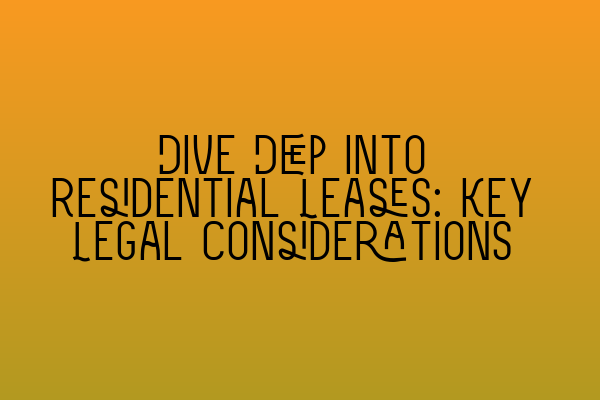Dive Deep into Residential Leases: Key Legal Considerations
Greetings, property owners and prospective homeowners! Welcome to SQE Property Law & Land Law, your trusted solicitors for all things related to property and land law. In today’s blog post, we will dive deep into the world of residential leases and explore the key legal considerations you need to be aware of. So buckle up and get ready to discover the ins and outs of residential leases.
What is a Residential Lease?
Let’s start with the basics. A residential lease, also known as a tenancy agreement, is a legally binding contract between a landlord and a tenant. It outlines the terms and conditions of the rental arrangement, including the duration of the lease, rent amount, rights and obligations of both parties, and other important details related to the use and occupation of the property.
Understanding the legal aspects of a residential lease is crucial for both landlords and tenants to ensure a smooth and fair tenancy experience. In this blog post, we will cover some key legal considerations that will help you navigate the intricacies of residential leases.
1. Terms and Duration of the Lease
The first essential element of a residential lease is the term or duration of the tenancy. This aspect determines how long the tenant has the right to occupy the property and the corresponding obligations of the landlord. It is important to clearly define the start and end dates of the lease to avoid any ambiguities or disputes. Additionally, any renewal or termination clauses should be included to provide clarity for both parties.
For a comprehensive understanding of contractual terms and limitations, refer to our related article on Understanding Contractual Capacity: Rights and Limitations.
2. Rent and Payment Terms
The next crucial aspect of a residential lease is the rent amount and the payment terms. The lease should clearly state the agreed-upon rent, whether it is a fixed amount or subject to periodic increases. It should also specify the frequency and method of payment, as well as any penalties for late payments or bounced checks.
3. Maintenance and Repairs
Both landlords and tenants have responsibilities when it comes to the maintenance and repairs of the rented property. The lease should clearly define who is responsible for specific repairs and maintenance tasks, such as plumbing, electrical, or structural issues. It is advisable to include provisions for regular inspections and a process for reporting and resolving maintenance issues.
For a deeper dive into the rights and responsibilities of parties in a contract, refer to our related article on Parties in a Contract: Rights and Responsibilities.
4. Assignment and Subletting
In some cases, tenants may wish to assign or sublet the property to another party. The lease should clearly outline the landlord’s consent requirements for such arrangements. Some leases may prohibit assignment or subletting altogether, while others may allow it with prior written consent from the landlord. It is essential to understand the terms and conditions related to assignment and subletting to avoid any legal issues down the line.
5. Termination and Renewal
At the end of the lease term, both parties need to be aware of their rights and obligations regarding termination and renewal. The lease should state the notice period required for termination and any conditions for automatic renewal. Additionally, it should outline the process for returning security deposits and resolving any outstanding issues before the end of the tenancy.
For a comprehensive analysis of recent changes in contract law, check out our related article on Contract Law Reforms: An Analysis of Recent Changes.
Conclusion
Residential leases can be complex but understanding the key legal considerations is essential for both landlords and tenants. By paying attention to the terms and duration of the lease, rent and payment terms, maintenance and repairs, assignment and subletting, and termination and renewal, you can ensure a smooth and mutually beneficial tenancy experience.
For interactive SQE mock tests and expert guidance on contract law, don’t forget to join our SQE Contract Law webinars. Test your knowledge and enhance your understanding of residential leases and other important legal concepts with our expert insights.
